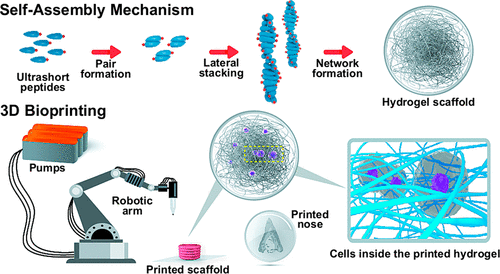
Ultrashort peptide bioinks support automated printing of large-scale constructs assuring long-term survival of printed tissue constructs
H.H. Susapto, D. Alhattab, S. Abdelrahman, Z. Khan, S. Alshehri, K. Kahin, R. Ge, M. Moretti, A.-H. Emwas, C.A.E. Hauser
Nano Letters, 2021
We report about rationally designed ultrashort peptide bioinks, overcoming severe limitations in current bioprinting procedures. Bioprinting is increasingly relevant in tissue engineering, regenerative and personalized medicine due to its ability to fabricate complex tissue scaffolds through an automated deposition process. Printing stable large-scale constructs with high shape fidelity and enabling long-term cell survival are major challenges that most existing bioinks are unable to solve. Additionally, they require chemical or UV-cross-linking for the structure-solidifying process which compromises the encapsulated cells, resulting in restricted structure complexity and low cell viability. Using ultrashort peptide bioinks as ideal bodylike but synthetic material, we demonstrate an instant solidifying cell-embedding printing process via a sophisticated extrusion procedure under true physiological conditions and at cost-effective low bioink concentrations. Our printed large-scale cell constructs and the chondrogenic differentiation of printed mesenchymal stem cells point to the strong potential of the peptide bioinks for automated complex tissue fabrication.


"KAUST shall be a beacon for peace, hope and reconciliation, and shall serve the people of the Kingdom and the world."
King Abdullah bin Abdulaziz Al Saud, 1924 – 2015
Thuwal 23955-6900, Kingdom of Saudi Arabia
Al-Haytham Building (Bldg. 2)
© King Abdullah University of Science and Technology. All rights reserved